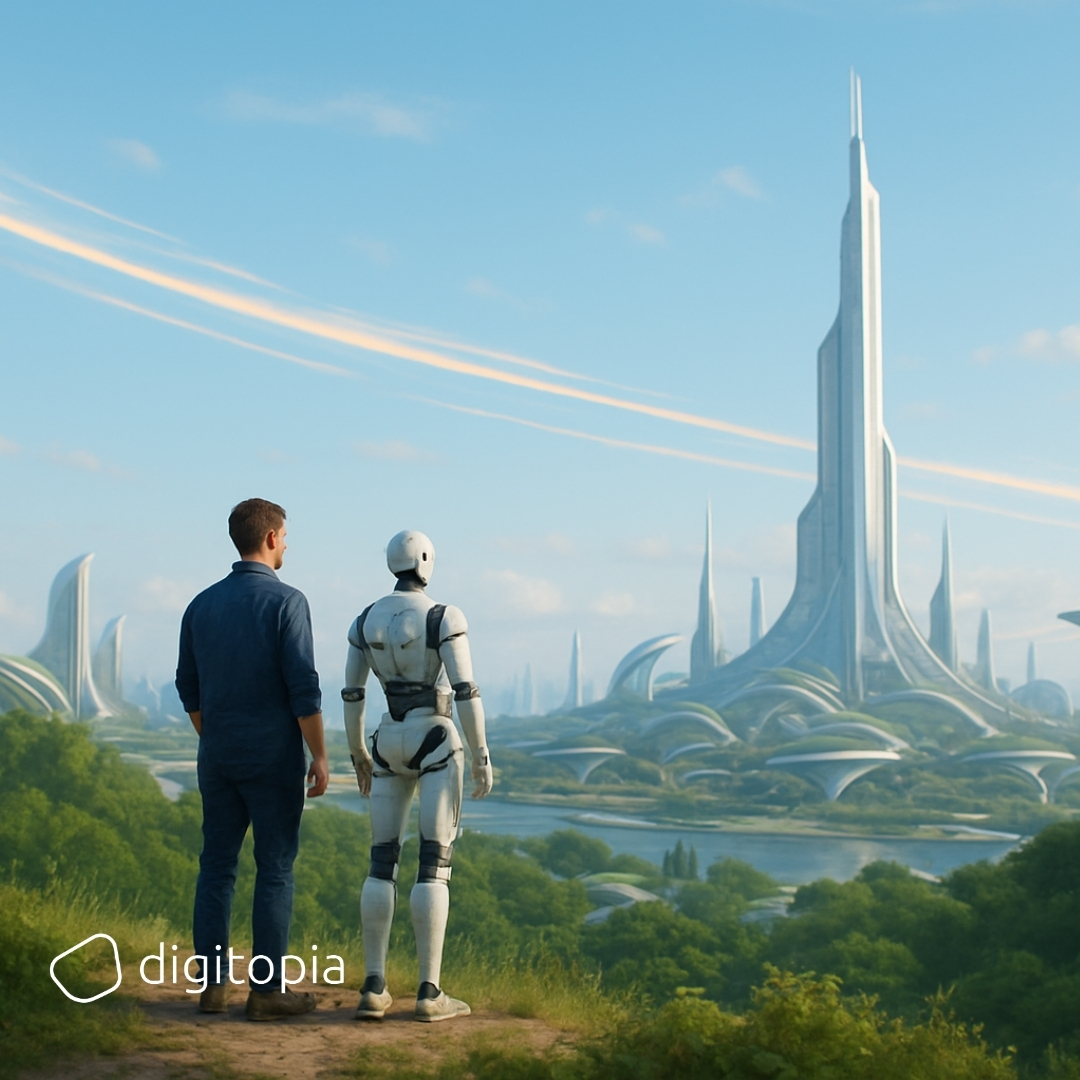
Our spacecraft gently touched down on the designated landing zone. As the doors opened, we were greeted by a team of welcoming hosts. The atmosphere was electrifying, with hundreds of other spacecraft arriving simultaneously. There was no confusion, no delays. The entry process was seamless, thanks to the meticulously organized interplanetary protocol, where every visitor’s purpose—whether as a diplomat, speaker, or guest—was already known and accounted for. Welcome to Planet of the Mans!
On this planet, two distinct species coexist in harmony. One is the Bots, small autonomous robots that handle all operational and rational tasks with precision, akin to the left hemisphere of the human brain. The other species is the Mans, a smaller, evolved human-like species dedicated to culture, art, and creativity, with a highly developed right brain. The Bots take care of everything logical and routine, leaving the Mans free to explore and expand their artistic and cultural pursuits.
The Mans and the Bots live in peace, each appreciating and benefiting from the strengths of the other. The Bots handle all the operational and rational work, making decisions and executing tasks with a speed and accuracy that the Mans have long accepted they cannot match. The Mans, in turn, have focused on what they do best—creating, imagining, and innovating in ways that transcend the ordinary.
We had arrived on Planet of the Mans for the United Planets Conference (Uni-Versum). As soon as we disembarked, the Bots efficiently completed our entry formalities and provided us with a transport Bot. This intelligent vehicle, more than just a car, recognized our digital identities the moment we boarded and whisked us off to our hotel. The journey was smooth, but the Bot couldn’t resist teasing us with questions.
“So, you’re from Earth?” it asked. “I hear you’ve only just begun to dabble with robots?” “And you still have humans doing most of the work?” “You must be very behind on cultural and artistic developments!” The jibes were relentless, leaving us feeling like Earth was the third world of the galaxy.
At the hotel, everything ran like clockwork, managed entirely by Bots. From check-in to room service, every task was handled swiftly, politely, and flawlessly. The only Mans we encountered were those engaged in creative tasks—children’s activities, artistic performances, and cultural programs. This was, after all, Planet of the Mans.
The conference was a delight. Delegates from various planets mingled, sharing knowledge and ideas. It felt like being on the set of a Star Wars movie, but with a profound sense of peace and unity. During the breaks, the Mans treated us to cultural programs, showcasing how much art and culture could contribute to interplanetary harmony.
One evening, we met a group of Mans, including a particularly elderly one named Eli. Eli loved to tell stories about the past, about the times when the Mans and Bots lived differently. We listened with rapt attention as he recounted his tale.
“My grandfather used to tell me,” Eli began, “that there was a time when the Mans were just as involved in day-to-day operations as the Bots. Back then, Bots were fewer in number, and the Mans handled many tasks themselves—administrative, operational, you name it. But as the Bots became more capable, they gradually took over. They could think rationally, process tasks faster, and make decisions based on logic alone—no favoritism, no emotions, just pure efficiency.”
Eli sighed deeply before continuing. “Over time, the Mans realized they couldn’t compete with the Bots in these areas. They began to focus on what they were naturally good at—arts, music, architecture, and philosophy. The Bots handled the mundane, freeing the Mans to explore their creative potential. And as they did, the Mans’ cultural contributions became renowned across the galaxy, attracting visitors from distant planets who wanted to experience our way of life.”
Eli’s pride in his heritage was evident. But he also acknowledged the Bots’ role in making this possible.
“You see,” he explained, “the Bots started as a simple idea. Much like your experiments on Earth today. We began over a century ago, identifying tasks that we, the Mans, found tedious or challenging—tasks that were repetitive and could be standardized. We decided to let the Bots handle those. Over time, the Bots took over more and more. They became indispensable, handling everything from simple mail sorting to complex medical diagnoses and public safety decisions.”
Intrigued, we asked Eli for more details. How were the Bots programmed? How did they reach such an advanced level of automation and efficiency?
“Good questions,” Eli replied. “The key was starting with the simplest, most rational decisions. Anything that could be explained with logic could be modeled mathematically, and anything that could be calculated could be automated. We formed small expert teams to develop these models, starting with straightforward decisions and gradually moving on to more complex ones. The process was iterative, constantly refined and improved.”
As Eli spoke, it became clear that he wasn’t just any old man—he was a Machinist, one of the original programmers who had developed the Bots. His insights were invaluable, offering a glimpse into how their world had evolved.
“We began with basic decisions,” Eli continued, “like sorting mail by zip code. Then we moved on to more complicated processes, like credit approvals and medical decisions. The Bots learned from each scenario, and we, the Machinists, refined their programming with each new challenge. Over time, the Bots handled more and more, until the Mans were free to focus on what they loved—creating beauty, inspiring others, and promoting peace.”
Eli’s story resonated with us as we returned to our conference. We finished our discussions, boarded our spacecraft, and headed back to Earth. The experience on Planet of the Mans was eye-opening. We wondered when, if ever, our world would reach the same level of automation, where machines handled routine decisions, freeing humans to explore higher pursuits.
What Does This Story Tell Us?
Eli’s tale of Planet of the Mans offers a glimpse into a future where automation and creativity coexist harmoniously:
Automation Enables Creativity: By automating routine tasks, we free up human potential for more meaningful work—art, culture, and innovation.
Progressive Adoption: Start with simple decisions, then gradually move to more complex ones as confidence and technology improve.
Balanced Integration: Automation should complement human skills, not replace them, creating a balanced and harmonious society.
Cultural Impact: As routine tasks are automated, humans have more time to engage in creative pursuits, enriching society as a whole.
Automating Decisions for a Creative Future
Just as the Mans relied on Bots to handle their routine tasks, freeing themselves to focus on art and culture, the AI Maturity Index (AIMI) provides a framework for organizations to automate decision-making processes. The AIMI helps companies identify which areas can benefit from automation, allowing them to allocate human resources to more strategic and creative roles.
Automation is not about replacing humans but about elevating them. By automating the mundane, organizations can unlock their true potential, driving innovation and achieving excellence. The AIMI guides this transformation, ensuring that what’s measured gets done, and that automation serves as a catalyst for creativity and growth.


